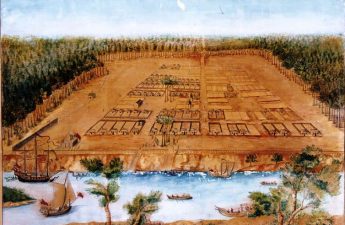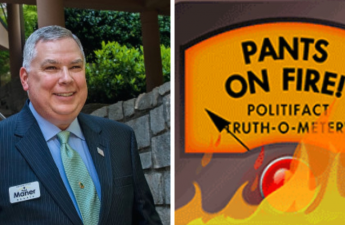Or, why does Charlie Sherman think Pulaski, Tennessee sits atop the mouth of Hell?
Check out this excerpt from Brambleman, winner of the 2013 Benjamin Franklin Award for popular fiction. It it, Charlie Sherman discovers the root of some evil.
From Chapter Thirteen of Brambleman, a novel by Jonathan Grant (all rights reserved):
* * *
Isaac Cutchins’s parents had come to Forsyth County from Pulaski, Tennessee. This Charlie knew because Susan’s Bible told him so, and being a border-state Yankee, Charlie never forgot it, since Pulaski was the birthplace of the original Ku Klux Klan—the terrorist arm of the Southern Democratic Party during Reconstruction. When Charlie thought of Momo’s monster truck, Nathan Bedford Forrest, he realized that it was only fitting that Pappy’s trail would lead back to that town.
In an attempt to find out more about the family’s roots, Charlie searched the Internet for genealogical background data, hoping to find dirt on the cheap. No dice: The Net would have nothing to do with the varmints. Therefore, duty called for a pilgrimage to the Tennessee town—Pulaskipalooza, Charlie dubbed the trip. Angela would cover for one night with Kathleen, and Susan agreed to pick up the kids from school that day, even though he wouldn’t tell her what he was up to.
Well before dawn on that crisp October day, Charlie departed Bayard Terrace for the four-hour drive with two peanut butter sandwiches and a Thermos full of coffee. The moon was a waning crescent when he passed through Chattanooga, switching from I-75 to I-24 for the trek across southern Tennessee.
Charlie pulled into Pulaski with the morning sun at his back. He parked near the Giles County Courthouse. The Beaux Arts structure, built in 1909 to replace its burned-out predecessor, was garishly beautiful, with large columns on the front portico and smaller ones supporting an oversized dome. Bleary-eyed and road-weary, Charlie saw it as a hungry Chinese dragon preparing to eat the town. When he stepped out of the van, the smell of sulfur hung heavy in the air.
He walked past the statue of Count Casimir Pulaski and went inside to the records room. He found some old deed books containing relevant information and took notes on land ownership by Cutchinses in Giles County after the Civil War. The trail disappeared after 1907, when the antebellum courthouse was destroyed by fire. Hmm. He tapped the tabletop with his fingers. There had to be more. He trudged out of the courthouse into the bright sunlight, squinting and shielding his eyes with his hand, then waving off the stinkpit odor that permeated the town. It smelled … like hell. Or maybe he was crazy.
His next stop was Pulaski’s one-story gray stone library, which looked like a sawed-off federal office building. When he entered its special collections room, an older woman wearing a blue floral print dress looked up from her book and frowned at him over her trifocals. Charlie stood before the local histories and found an authoritative-looking work, The Big Book of Giles County History by William Conger, published in 1939. Thurwood would have envied the 1,000-page tome. Charlie turned to the index and found four marvelously dreadful entries under the Cutchins name:
Cutchins, Lemuel, Shot by commanding officer for cowardice, 234;
Cutchins, Render, Received letters of dismissal from First Baptist Church 301—303;
Cutchins, Samuel, Talbot, et al., Ordered to leave Giles County, 323—324; and
Cutchins, Talbot, Tried in absentia for Giles County Courthouse fire, 324.
Charlie hooted at this mother lode of varmintry. The woman gave him the evil eye. “Sorry,” he muttered. He turned to page 234 and read as he stumbled to the table next to her spread-out genealogy books:
Lemuel Cutchins, born in 1839, joined the Tennessee Militia, a fighting unit of the Confederate States of America. A chronic deserter, Cutchins received a bullet in his backside from his commanding officer, Capt. Wilson Johns, an excellent shot and first-rate horseman, on August 14, 1864, while running away from a skirmish with Union foragers near Sandy Creek. This was the third time Cutchins had shown cowardice, and he was listed as deserting under fire.
Lemuel disappeared and later returned to Giles County amid widespread and well-deserved enmity from neighbors, since, in addition to being a known coward, he was rumored to have been a highwayman in Kentucky. Reportedly, he used his ill-gotten gains as a robber to purchase a homestead in Giles.
Charlie turned to page 301 and learned, to his shock, horror (and delight), that Render, son of Lemuel, had been
… found guilty of gross immorality by the First Baptist Church’s board of deacons in 1895 for having engaged in a practice too loathsome to mention. Following his expulsion from the church, Render Cutchins was believed to have tried to make a fresh start with his three wives, a male cousin, and several beleaguered and degraded sheep in Utah, where such perversion might be deemed permissible. Render Cutchins and his ilk will have to answer to a higher power than the Mormon Church when their wretched days on earth are done.
These entries were all the more scandalous coming as they did in an otherwise dry, pedestrian book that consisted mainly of lists of names and histories of gristmills. Indeed, Conger failed to mention Pulaski’s glorious role in the birth of the Klan—an exclusion that in and of itself spoke volumes about Southern history. Charlie wondered if any Cutchinses had belonged to the original Klan. (However, he suspected that the varmints didn’t meet that organization’s standards. Bradley Roy had told him that Momo tried to join the Klan in 1987, but his dues check bounced.) In any case, the Cutchinses’ outrageous behavior awoke the prose stylist in Conger, who railed against those miscreants in righteous indignation.
Charlie became engrossed in the transcription of the minutes of the meeting at which Render Cutchins was cast out of the local church. There were smudges all over the page, while most others in the book remained pristine. One subsequent summary passage was especially well-read:
The banishment of Cutchinses from the county was tied to Render’s expulsion from First Baptist Church, although they did not leave all at once. While Render took his leave of Giles, family members who remained took offense at his “ill treatment,” and there was a war between them and their neighbors involving arson and livestock killings lasting several years. The conflict culminated in the jailing of Lemuel’s brothers, Samuel and Talbot, and two of their sons for burning down the First Baptist Church. The men would escape confinement before trial, however. After that, their families were driven from Giles at gunpoint. For several months, the valiant men of Giles remained on alert to prevent any of the Cutchins clan from sneaking back into Giles to cause more destruction and mischief. Their vigilance proved insufficient, however. According to the trial record, Talbot Cutchins evaded the patrols and set fire to the Giles County Courthouse, then disappeared. He was tried in absentia and found guilty of arson in the first degree. His whereabouts remain unknown to this day.
 Brambleman is on sale now, by the way. Kindle and Nook versions are only $6.99. That’s $2.00 the regular price. Grab the eBook today! Best price on the paperback is here.
Brambleman is on sale now, by the way. Kindle and Nook versions are only $6.99. That’s $2.00 the regular price. Grab the eBook today! Best price on the paperback is here.
 Brambleman won the 2013 Benjamin Franklin Award for popular fiction. The award was announced May 29 at the IBPA’s annual banquet in New York in a prelude to Book Expo America. You can read more about it here.
Brambleman won the 2013 Benjamin Franklin Award for popular fiction. The award was announced May 29 at the IBPA’s annual banquet in New York in a prelude to Book Expo America. You can read more about it here.
Liked this post? Follow this blog to get more.




